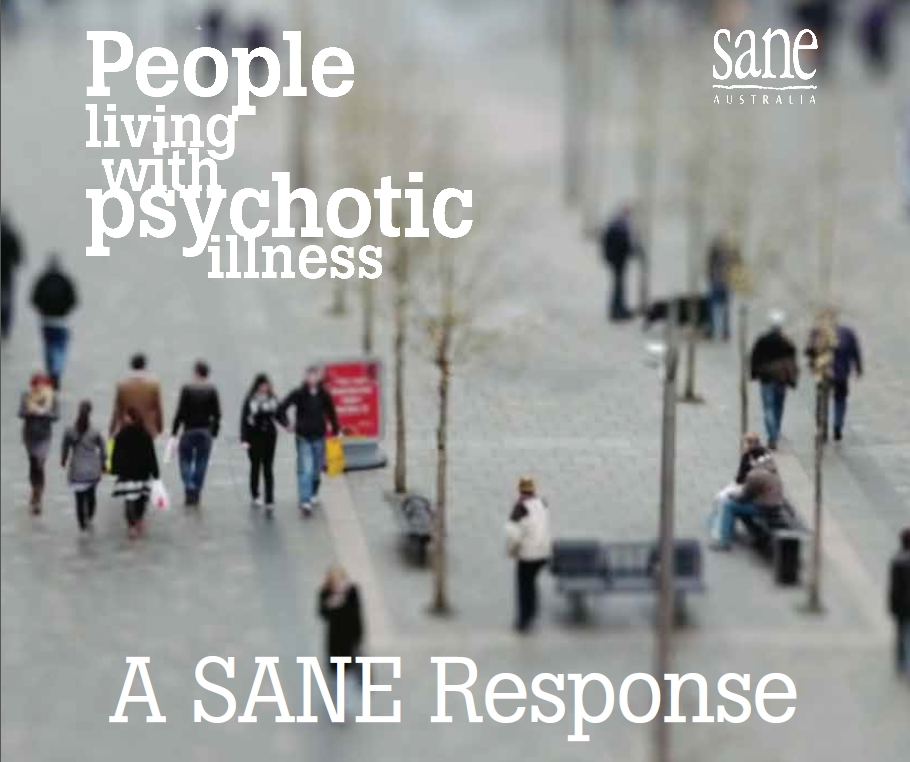 Yesterday the Minister for Mental Health, Mark Butler, joined with SANE Australia to officially launched a comprehensive report People living with Psychotic Illness 2010. SANE Australia is an independant non-Government organisation who campaign for people affected by mental illness. A press release was issued by the Minister highlighting a few of the key points from the report about hospital admissions, community programs, and the need for greater residential care for people experiencing psychosis
Yesterday the Minister for Mental Health, Mark Butler, joined with SANE Australia to officially launched a comprehensive report People living with Psychotic Illness 2010. SANE Australia is an independant non-Government organisation who campaign for people affected by mental illness. A press release was issued by the Minister highlighting a few of the key points from the report about hospital admissions, community programs, and the need for greater residential care for people experiencing psychosis
Indeed, these are essential areas of need that must be expanded in our mental health system. But what else did the report say, and how did SANE Australia respond to it?
The full 176-page report gives praise for positive outcomes associated with the Better Access program for people experiencing psychosis (page v, emphasis added):
There have also been major changes in the way general practitioners are funded through Medicare to provide mental health services and the availability of psychological services with the introduction of the Better Access initiative in November 2006. At the same time there has been a shift in the medications used in the management of delusions and hallucinations. Three quarters of people with psychotic illness now take ‘atypical antipsychotics’, which have fewer neurological side affects. The 2010 survey provides evidence of these reforms and the way in which they’ve markedly improved the lives of people experiencing psychotic illnesses.
SANE Australia has also provided an easy-to-read 24-page overview condensing the report into 10 key areas, with concise summaries of the relevant statistics around the experiences of people with mental illness in our health care system. Most importantly, SANE Australia recommend action to improve the system so that it better serves the needs of people living with psychosis. Page 17 of the report deals with GP services and notes these important statistics:
One in three (31.3%) people with psychotic illness attended their GP for depression, and a similar proportion (30.3%) for an anxiety disorder.
Nine out of ten (90.6%) people with psychotic illness had not been prescribed a mental health care plan by their GP.
Further down the page, the SANE report recommends that the following action could be taken to improve the system (emphasis added):
GPs have an increasingly central role in treatment of people with psychotic illness. As well as providing primary care, they act as gatekeepers for a range of specialist services, including the Better Access and ATAPS initiatives. This role will only grow with the spread of the Medicare Local model of care. The high rates of anxiety and depression suggest that more people could be prescribed mental health plans in order to access psychological treatments.
For those people who may not be aware what the term ‘mental health plan’ means, it is the name for a GP referral to the Better Access program. In other words, the report from SANE Australia has advised the Australian Government to encourage GPs to refer more people with complex conditions to the Better Access program, which in our opinion is a very wise and sensible recommendation. Specifically, they are talking about people with psychosis and co-morbid depression and anxiety, with the view of helping people with these conditions receive appropriate evidence-based therapies to address the additional depression and anxiety they experience.
But wait a minute. Hasn’t the Minister been claiming since May that he was helping people who experience mental illness, by cutting services down to a maximum of ten sessions, with no exceptions? And hasn’t he been trying to tell the public that the Better Access program is not suitable for people with complex conditions? The simple fact is that he is wrong on both counts – and this report from SANE Australia confirms it outright from a consumer-focused perspective.
These strong recommendations from SANE Australia join with other large and well-established mental health care advocacy groups, who have put their support behind Better Access, including the Blackdog Institute, Suicide Prevention Australia, the Australian Psychological Society, the Australian Medical Association, and many others. They join with over a thousand other individuals who wrote detailed submissions to the senate inquiry, urging the Government to reconsider the cuts to the Better Access programs. The report from the Chair of the Senate Committee into mental health funding and administration recommends that access to 18 sessions of psychological services should be retained for people who need them. The Greens have made a statement that they are moving to disallow the Labor Government’s decision to cut this vital program. And in the background, there are over 6000 people who have signed a petition asking the Labor Government to reverse these cuts to psychological services. You can view their comments right here, to get a sense of how everyday people perceive these mental health cuts.
I don’t know what else to say to Mark Butler and the Labor Government, other than to tell them that they have obviously got this decision wrong. We live in a democracy, so I ask our political representatives to please consider what else it would take for the Australian people to get you to realise that this decision needs to be reversed. Fix it up please – our people deserve better.

